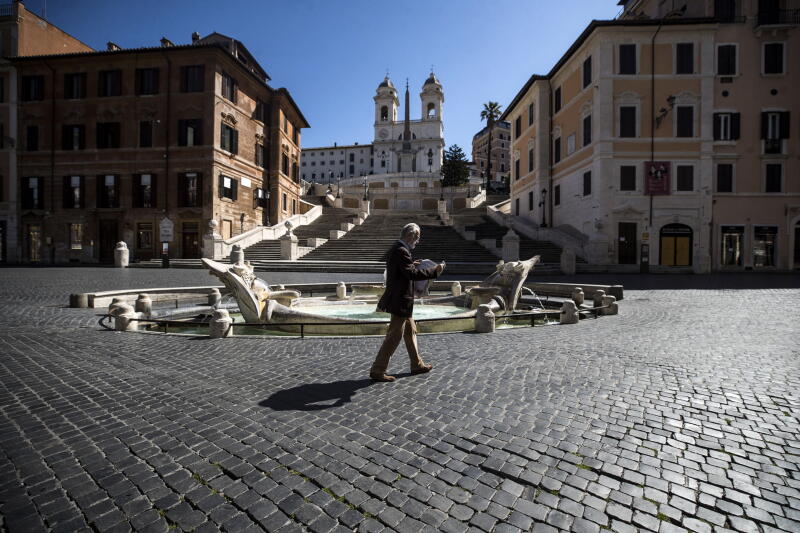Italy sets reopening plan with harsh caveat on second virus wave
Sign up now: Get ST's newsletters delivered to your inbox

Construction and manufacturing will be the first industrial sectors to be allowed to restart in Italy.
PHOTO: EPA-EFE/ANSA
ROME (BLOOMBERG, REUTERS) - Italian Prime Minister Giuseppe Conte said his country will start easing lockdown restrictions on May 4, setting up a key test of Europe's efforts to restart public life and economies immobilised by the coronavirus.
With a cautious reopening under way in several countries such as Germany, pressure in Italy has been building even as it suffers Europe's highest virus-related death toll.
Conte warned that a second wave of infections would cause a resurgence of deaths and "irreversible damage" to the economy.
"We all want the country to restart," the premier said at a briefing late Sunday in Rome.
"But the only way to live with the virus in this phase is to not fall ill - and social distancing."
Hours earlier, Italy reported the fewest deaths over a 24-hour period in six weeks and France counted the fewest in a month. Spain's increase was the smallest in more than a month.
France and Spain, the country with the most confirmed infections in Europe, also signalled tentative moves to restart their economies after weeks of lockdowns.
Italian leaders are trying to save an economy that's headed for an 8 per cent contraction this year and trailed its euro-area peers even before the pandemic.
Construction and manufacturing wholesalers will be the first sectors to be allowed to reopen, with retailers and museums to follow two weeks later and bars, restaurants and barbers potentially on June 1, according to Conte.
Yet if people in Italy fail to respect rules including social distancing, the curve of contagion "will rise and could become out of control, the number of our dead will increase and our economy will suffer irreversible damage," Conte said.
"The reopening is allowed on condition that all companies involved strictly respect security protocols in the workplace," he said, adding that the reopening would lay the ground for deeper reforms of the economy in the months ahead.
In addition, parks will be allowed to reopen and limited family visits and funerals with no more than 15 people present will be permitted. But movement between regions remains suspended and people moving about will still have to carry a declaration explaining the reasons for their journeys.
Museums and libraries can reopen from May 18, when sports teams will also be able to resume group training, although Conte said conditions would have to be assessed before any decision on resuming the top-flight Serie A soccer championship.
Schools will remain shut, however, until the start of the new academic year in September, leaving families facing childcare problems for months to come.
The lockdown has put a strain on the euro zone's third-largest economy, which is headed for its worst recession since World War Two. Italian business leaders have called for the restrictions to be eased to head off economic catastrophe.
Conte said the more limited restrictions would likely remain in place until the discovery of an effective vaccine or cure for Covid-19, which is not expected for many months.
On Sunday, Italian authorities reported a third consecutive daily fall in coronavirus fatalities, with 260 deaths, the lowest number since March 14.
Italy's death toll remains the heaviest in Europe, with more than 26,000 dead and almost 200,000 confirmed cases of the respiratory disease. But the number of new cases has been slowing and the number of patients in intensive care has been falling steadily.
Hit hard by the virus weeks before other major Western countries, Italy has been forced to serve as a model for how to fight it. It is being closely watched around the world as it takes its early steps to chart a path out of a strict lockdown it imposed in early March.
With more than 100,000 deaths in the region, Europe is also bracing for the worst recession in living memory. The crisis has exposed long-standing political rifts, with leaders struggling to approve 540 billion euros (S$832 billion) of short-term support measures and failing to make progress on a longer-term plan.
EU Divided
France and Spain are leading a group calling for the continent's recovery to be funded by grants from a supercharged European Union budget, while the Netherlands and Austria are among those insisting the additional funds should take the form of loans.
Paolo Gentiloni, the European Union's economic and financial affairs commissioner, called for a roughly 1.5 trillion-euro EU recovery fund to be available by mid-September. It should disburse both loans and grants, he said in an Italian television interview.
In Germany, new infections held at fewer than 2,000 for a second day on Sunday, though government officials warned against easing restrictions too quickly.
Foreign Minister Heiko Maas damped expectations of an early reopening of European travel destinations.
"A European race to see who will allow tourist travel first will lead to unacceptable risks," Maas said in an interview with Bild am Sonntag.
In Britain, the death toll topped 20,000 on Saturday, the fifth-highest in the world, and business has slowed to a crawl.
The UK reported a decline in deaths on Sunday to 413, the lowest since March 31.
Prime Minister Boris Johnson, who was hospitalised with a serious case of Covid-19, is due to return to work on Monday, where he'll face decisions about how and when to ease the lockdown.
Six business leaders, including Conservative Party billionaire donors Michael Spencer and Peter Hargreaves, wrote to the government asking it to ease restrictions, according to the Sunday Times.
"We should really begin to offer a narrative of how and when it's going to stop," Spencer told the newspaper.


